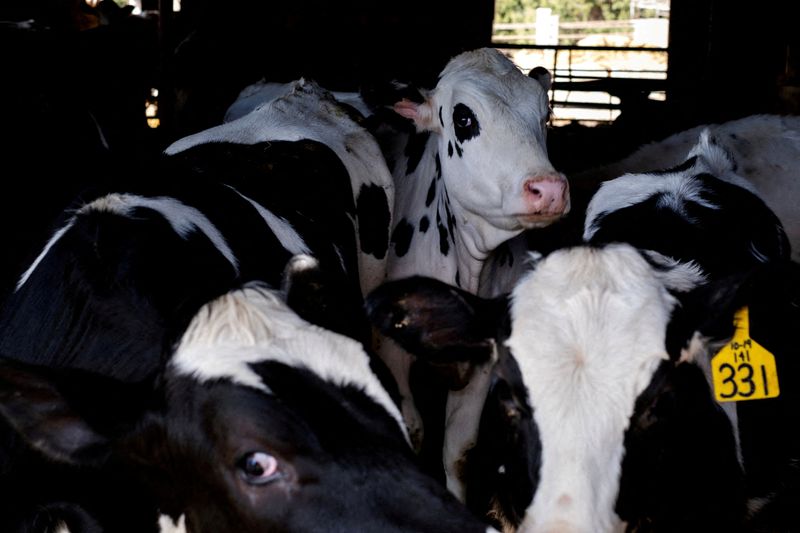By Tom Polansek
CHICAGO (Reuters) – The U.S. Agriculture Department has proposed allowing farmers to bulk test the milk of their dairy cows for bird flu rather than test milk from individual cows before gaining approval to ship them across state lines, according to state and industry officials and agency documents.
The spread of the virus to cows and two dairy workers since late March raised concerns about the threat of a pandemic, and government officials are trying to contain the disease while minimizing economic damage to the farm sector.
The agriculture department (USDA) in late April began requiring lactating cows to test negative before being shipped across state lines. It later said the order likely helped prevent the spread of the virus to new states.
USDA reported 2,492 pre-movement tests as of Wednesday but said that number does not equal the number of animals tested.
A pilot program for bulk testing milk could begin in June for farmers who choose to participate, according to documents USDA sent to industry officials this week that Reuters obtained.
Agriculture officials in six states told Reuters on Wednesday they were reviewing USDA’s proposal for the program, which has not been previously reported. USDA declined to comment.
“Once it has support and participation from farms, the USDA program could help reduce the threat of H5N1 in dairy herds, further mitigate risk among farm workers, and continue to protect our nation’s commercial milk supply,” the International Dairy Foods Association said in a statement to Reuters.
USDA has confirmed the H5N1 bird flu virus in cattle in nine states. The U.S. Food and Drug Administration estimated that 20% of the U.S. milk supply shows signs of the virus, indicating a wider spread is likely.
Farmers said testing milk from bulk storage tanks offers the chance to collect a sample from all the cows within a herd and would be more efficient than testing samples from individual animals.
Bulk tanks of milk from individual herds would need three consecutive weeks of negative testing results to show the herd is free of bird flu and enter the new program, according to USDA documents dated May 24.
Farmers would then need to submit milk samples from bulk tanks weekly to maintain their status, the documents say. Continued negative results would mean no additional testing is needed before shipping cattle between states, according to the documents.
USDA said it could establish disease freedom in states or regions if enough farmers participate. If a herd tests positive in the program, there would be an epidemiologic investigation and evaluation of movement for animals considered to be low risk, according to the documents.
The program would mostly benefit large dairies that move animals, veterinarians said.
Three weeks of testing milk from bulk tanks is not enough to confirm a herd is free of bird flu, though, said Gail Hansen, a veterinary and public health consultant. Samples from healthy cows could dilute samples from a small number of infected cattle in the same herd when their milk mixes in the tank, she said.
“It may give people a false sense of assurance,” Hansen said.
State officials said they have questions about the logistics of the proposed program.
Texas said USDA made state animal-health officials aware of the program but has not yet provided final details about how it will be implemented.
The program is intended to assist with disease control in cattle but could have negative market implications for farmers, said Bret Marsh, Indiana’s state veterinarian.
“Indiana’s biggest concern is: How will the information gathered be used? Any finding in Indiana could place us in the affected-state category, subjecting Hoosier producers to increased restrictions from other states,” he said.

Michigan, which has more confirmed cattle infections than any other state, is interested, said Tim Boring, director of the state’s Department of Agriculture and Rural Development.
“One of the basic safeguards here is to look at restricting animal movement,” he said. “The last thing we want to be doing is moving sick cattle around in different farms and thereby spreading the disease further.”

